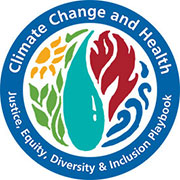PART 2: Enhancing BRACE with JEDI
 Due to systemic challenges, which create biases and racist policies and practices, and a lack of resources, JEDI is often not a leading emphasis in health adaptation planning. Although BRACE requires identification of sensitive populations and encourages public health departments to consider JEDI in their adaptation planning, there is a need for a comprehensive tool to support users in exploring JEDI-related challenges and infusing these principles more intentionally across climate and health adaptation efforts. This playbook focuses on the social determinants of health and health equity as they relate to climate and health adaptation work. Offering information and demystifying JEDI provides an opportunity to transform environmental, socioeconomic, racial and health disparities in the country.
Due to systemic challenges, which create biases and racist policies and practices, and a lack of resources, JEDI is often not a leading emphasis in health adaptation planning. Although BRACE requires identification of sensitive populations and encourages public health departments to consider JEDI in their adaptation planning, there is a need for a comprehensive tool to support users in exploring JEDI-related challenges and infusing these principles more intentionally across climate and health adaptation efforts. This playbook focuses on the social determinants of health and health equity as they relate to climate and health adaptation work. Offering information and demystifying JEDI provides an opportunity to transform environmental, socioeconomic, racial and health disparities in the country.
We offer suggestions on how your department’s progress through each step of the BRACE process can be enhanced with additional, focused attention to JEDI. Because this playbook is a companion document to CDC’s BRACE guidance, we encourage practitioners to refer to CDC’s compiled BRACE resources for full instruction.
BRACE is a flexible framework that is easily able to incorporate a JEDI focus and practice. The foundations of BRACE are detailed in Part I. Further, Preparing for JEDI and BRACE details steps for building community partnerships, assessing your department’s readiness and capacity for climate adaptation and mitigation planning through a JEDI lens.
You may also find it helpful to explore additional resources on the foundations of JEDI, including the Health Equity Guide by Human Impact Partners. This resource includes a set of strategic practices to advance equity in local health departments, such as allocating resources, building organizational capacity, and changing internal practices.
